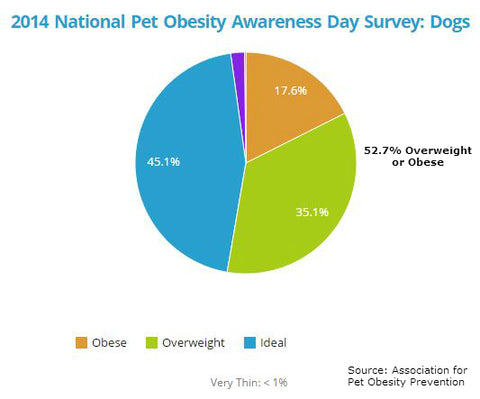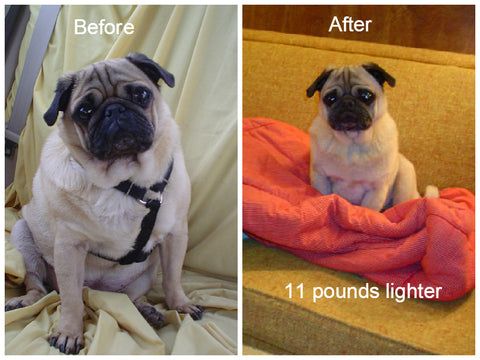Dog Obesity - What Every Senior Dog Parent Needs to Know

Why is weight so important?
As the problem of obesity continues to grow so are the medical conditions it often creates such as diabetes, osteoarthritis, high blood pressure and many forms of cancer. In fact obesity has become the number one health threat our dogs face. As parents we all know the challenges our senior dogs face, but were you aware that many of these conditions are avoidable? And even if a condition is not completely preventable, are you aware of how much better their lives could be if their weight was controlled?
At Dog Quality we have the privilege of speaking with so many dog parents who I know would do anything for their senior dog, but we still see so many dogs struggling because of excess weight. I suppose the rising number of overweight or obese dogs should not be completely shocking given that approximately 68% of human adults are also overweight or obese and if we cannot control this issue among ourselves, how can we help our dogs?
Well I believe we can because so often we put the needs of our dogs ahead of our own. I also think I understand why so many are not seeing the weight gain even when veterinarians point this out. We are so close with our dogs making it very difficult to see changes because they happen gradually, usually over long periods of time. Here is a trick that you can use to help identify changes in your dog - look back at photos! I myself, someone who obsesses over the weight of my dogs, have often been surprised at weight changes that I hadn't noticed until I looked at older photos that made me see the difference. It can be shocking. Eventually you'll get better at noticing the subtle changes before they become a problem, but sometimes it is useful to look back to better understand if you are going in the right or wrong direction when it comes to your dog's weight.
Challenges for older dogs
It is never too late to start making improvements in your senior dog's weight. Yes it is easier to help a younger, more active dog shed excess pounds, but you can also find success even if your dog is a senior - you just need the right strategy. One of my past dogs, Mackenzie my pug, became obese. I was one of those people who didn't see it. And when I did come to accept his weight as an issue I was so worried that it would cause too much strain on him that I let the problem go on for too long until I found a strategy that worked. Mackenzie had an enlarged heart and even a tiny bit of exercise caused him to hyperventilate. His problems however were made exponentially worse because of his weight so it was critical that he lose the excess pounds and he did! To break the cycle diet became the number 1 priority.
I had tried every low calorie food I could find, but the only food that worked for him was Hill's Reduced Diet (RD) which is purchased through most, if not all, veterinarians. Before Mackenzie could even begin to exercise we needed to make activity easier for him and with his new diet the weight started dropping. Then I would walk him in the morning and in the evening when it was coolest, starting with very short distances and increasing the distances gradually over time. The combo of the low calorie diet and exercise helped him drop 11 lbs! The new and improved Mackenzie blew me away. His energy went way up, he was much more mobile and I feel like this extended his life by years. He never hyperventilated again! I should mention that even with a low calorie food you have to be very careful about portions. Just because it has less calories doesn't mean you can feed them even more :)
My obsession with keeping my dogs skinny stems from the amazing transformation I saw with Mackenzie all those years ago. I vowed to never let one of my dogs become overweight again. He really showed me how difficult the extra weight made his life and how much better it could be just by shedding those extra pounds; a benefit that helped him throughout his senior years. With so many medical conditions out of our control it is empowering to know how much we can improve or prevent problems by helping our dogs maintain a healthy weight.
While Mackenzie is no longer with me I continue to fight the weight battle with all my dogs. I'm not going to pretend that it's easy because it's not, especially if you have food monsters like I do who act like they have not eaten for days. So while it is always a challenge, it is more than worth it and even if your dog would prefer a bottomless bowl, they will thank you by having more energy and by being healthier and happier.
A trick I do now that has been working great is I give my dogs a mix of kibble and green beans which allows me to keep their kibble portions under control and still leave my dogs feeling full without the extra calories. I also learned to cut out all soft food which has so many calories. It's just plain kibble for my dogs and if softening is needed, I simply soak the kibble in warm water.
So no matter what age there are always ways to help your senior dog reduce that extra weight and I promise that you will have a healthier and more energetic dog in no time! Once you see the difference this can make - you will be forever changed.
Ann-Marie Fleming is the Founder & CEO of Dog Quality, a provider of products focused on improving the quality of life for older dogs.

